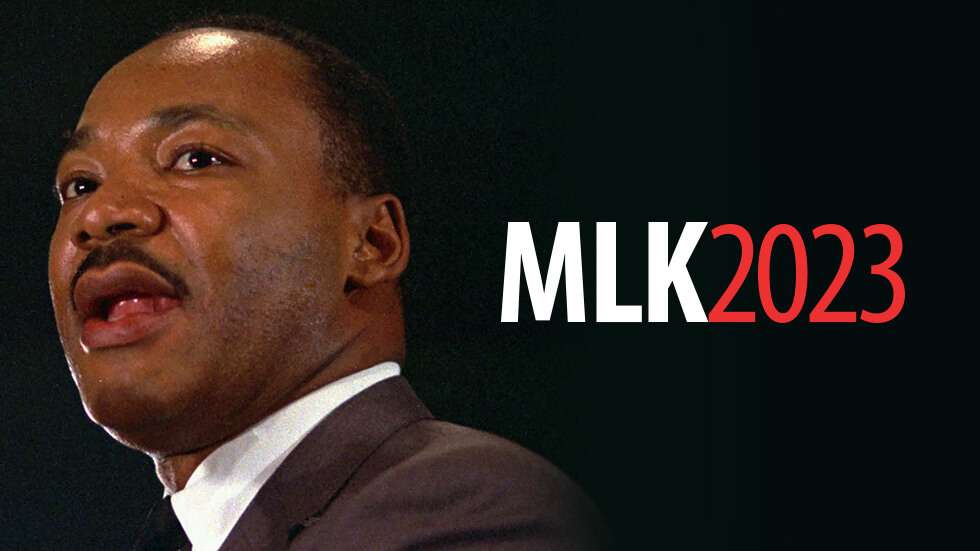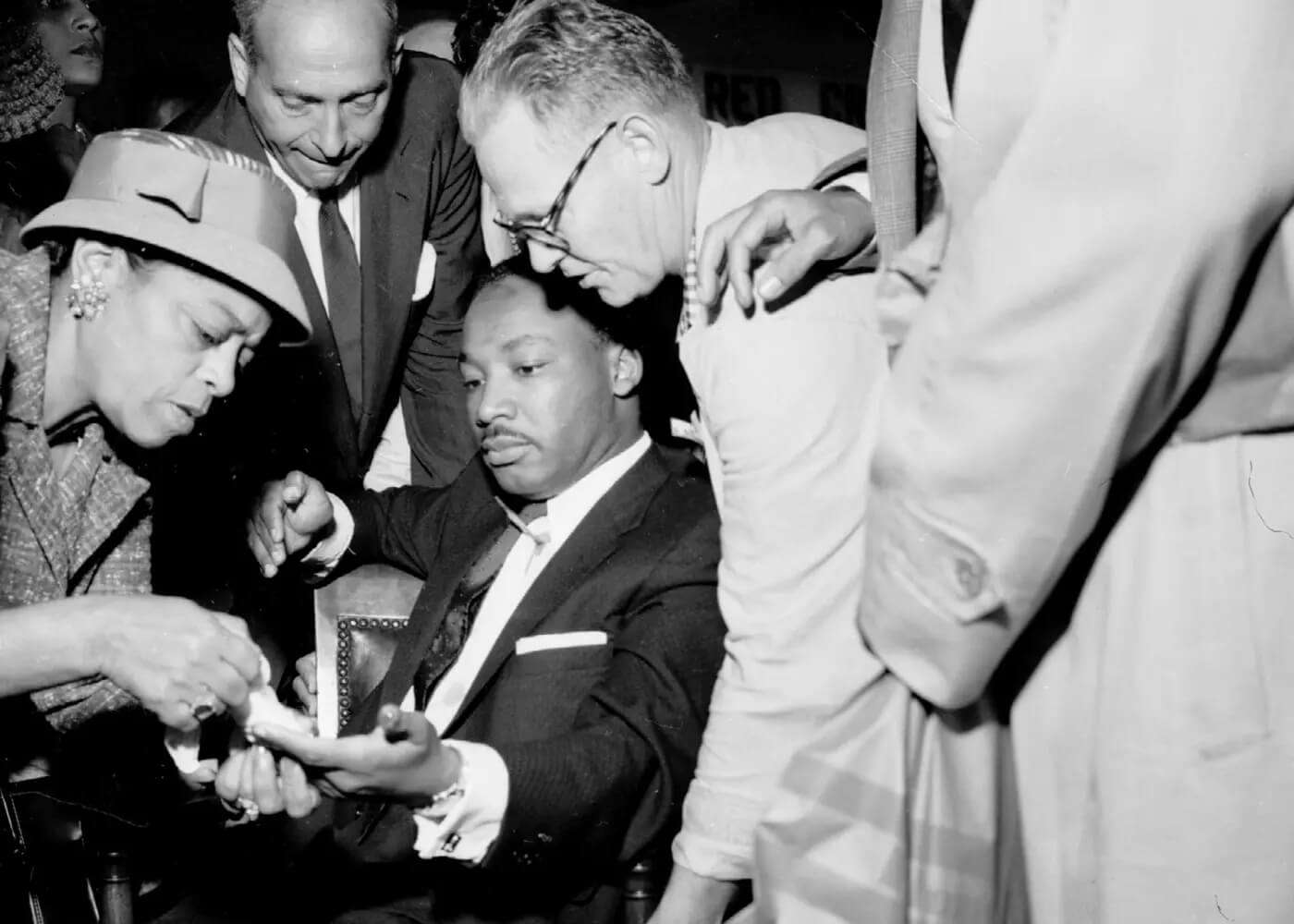
4 Things Most People Don’t Know About MLK
Today is the day Americans celebrate the life and legacy of Rev. Dr. Martin Luther King, Jr. There are many aspects of his life that everyone knows, such as his prominent role in the Civil Rights Movement of the ’60s, his work as a pastor and union organizer, and the near-constant harassment and conspiracy theories he had to endure. Yet, there are still many chapters of his biography that remain largely unknown. Here are five things most people still don’t know about the Human Rights icon.
Martin Luther King Jr.’s birth name was actually Michael King Jr.
Every year on the third Monday of January, America celebrates the life and legacy of Dr. Martin Luther King Jr., a champion of civil rights and a symbol of peace. However, very few people are aware that this historic leader was born under another name: Michael King Jr. Martin Luther only adopted his famous name after his father, a prominent Pastor in Atlanta, GA, changed both their names to Martin Luther in honor of Protestant reformist Martin Luther following an extended tour of Europe and Germany in 1934. While the exact reasons for the change remain a topic of debate, the elder King swiftly replaced “M.L.” or “Mike” King with “Martin Luther King, Sr.”
The younger King was more reticent about the name change. His original birth certificate was filed on January 15, 1929, when he was already five years old. He did not start referring to himself by “Martin,” in his letters until well into the 1950s, preferring instead to sign off with the initials “ML.” The first time he seems to have formally used the name Martin was in a July 18, 1952, letter to his then-girlfriend and future wife, Coretta. He ends the beautiful missive with “Eternally Yours, Martin.”
His name was formally changed when his birth certificate was updated with “Martin Luther” on July 23, 1957, when he was 28.

He was nearly assassinated a decade before his actual assassination
One of the stranger stories about King’s life happened on a cool September afternoon in the shoe section of a bustling Harlem department store when he was 29. King had become a national figure following the Atlanta bus Boycotts triggered by Rosa Parks’ refusal to sit at the back of a bus. King had written a book about the event called Stride Toward Freedom. While promoting the book, a 42-year-old black woman named Izola Ware Curry stepped forward and stabbed King in the center of his chest with a pen knife. She stabbed him with so much force that the blade broke off in his chest and remained there as the shocked crowd jumped to restrain her.
Photos from the attempt on his life are eery. In the most famous, King is shown calmly having a wound on his hand treated while the blade juts from his chest, a small circle of blood spreading under his otherwise clean white shirt. (Take another look at the photo above.)
Curry was arrested, and it was later determined that she was mentally unwell. She died in 2015 after spending the rest of her life struggling with paranoid schizophrenia.
His “I Have A Dream” speech was not originally planned.
The “I Have A Dream” speech delivered at the steps of the Lincoln Memorial in Washington, DC, is one of the most iconic speeches of all time. But interestingly enough, it was largely off-script; the words were mostly improvised. Before delivering the speech on August 28, 1963, in front of an estimated 250,000 people, King wrote a 20-page manuscript that his advisors had reviewed. However, throughout his speech, he made substantial changes – substituting facts with emotional appeals to rally civil rights supporters to action. The words “I have a dream” do not appear in his speech notes.
The “I have a dream” section was almost entirely improvised and was based on a sermon that his parishioners knew well. Towards the end of the remarks, a voice can be heard calling for him to “do, ‘I have a dream! Tell them about the dream, Martin!”
That voice belonged to Mahalia Jackson, a vocalist who had sang hymns to the crowd before King was scheduled to speak. King had often performed versions of what would later become the “I have a dream” speech at engagements around the South. But, he had not included it in his address at the Lincoln Memorial because he didn’t think he could fit it in. Hearing Jackson’s calls to him changed his mind, and King delivered remarks that would be recited for centuries.
He was arrested more than 30 times.
King was regularly denounced as a “criminal,” a “Communist,” and a “troublemaker.” And police at the time were not reluctant to arrest him for any and every accusation made against the human rights leader. Over his career, King was arrested after being accused of standing illegally outside a government building, lying under oath, driving 5 miles over the speed limit, and tax evasion, among many other accusations. Notably, King was also regularly acquitted of these allegations by all-white juries that prosecutors had hoped would hand down lengthy prison sentences.
Exasperated, in December 1959, the Governor of Georgia, Ernest Vandiver dropped all pretense and simply outlawed Dr. King altogether. Claiming that King’s presence anywhere in the state would disrupt the “good relations between the races,” and that “wherever M. L. King, Jr., has been there has followed in his wake a wave of crimes including stabbings, bombings, and inciting riots, barratry, destruction of property, and many others” he placed him under constant police surveillance.
While King certainly had powerful enemies but also friends in high places. Among them were John F Kennedy, Jr. and his brother, Robert Kennedy, who regularly made calls for his release from jail. Moreover, the arrests led to some of the most poignant writing in American history, as they allowed King to use his considerable skills to create such works as “Letters From Birmingham Jail.”
This May Day, Say You’re #Union Yes – and Support Organizing
This May Day, Say You're #UNION YESAFL-CIO1 May 2022All across the nation, workers are fed up and fired upSponsored by the AFL-CIO 2022 is turning out to be an incredible year as workers are voting to join unions and improve their lives. From baristas to warehouse...
Justice at JetBlue: Union Organizing is a Federal Right
UNIONIZING IS A FEDERAL RIGHT; NO NEED TO BE AFRAIDJustice at JetBlue28 April 2022The right to organize and join a union are fundamental employment rights under federal labor laws. JetBlue management is prohibited under federal law from ever knowing who signed an...
Union Members (And Only Union Members) Have Merger Protections
Union Members (And Only Union Members) Have Legally-Binding Merger ProtectionsJustice at JetBlue21 April 2022The benefits of a Union Contract: legal protections in the event of a merger.JetBlue’s bid to acquire and merge with Spirit Airlines comes with many questions...
Machinists Union Demands Answers to JetBlue’s Potential Misuse of Taxpayer-Funded Airline Aid
Machinists Union Demands Answers to JetBlue’s Potential Misuse of Taxpayer-Funded Airline Aid Justice at JetBlue13 April 2022The IAM is seeking answers to JetBlue’s possible misuse of funds from the Payroll Support Program (PSP), a component of the Coronavirus Aid,...
8,000 Amazon Workers Vote to Unionize – JetBlue Ground Ops is Next
Message from JetBlue Ground Ops:8,000 Amazon Workers Vote to Unionize - We're Next! Justice at JetBlue7 April 2022 Over 8,000 Amazon workers voted to unionize last week. These brave Amazon workers cited sub-standard working conditions and the ability to have a VOICE...
JetBlue Bids $3.6 Billion for Spirit; Union Representation Critical for At-Risk Work
Message from JetBlue Ground Ops:JetBlue Bids $3.6 Billion for Spirit; Union Representation Never More CriticalJustice at JetBlue6 April 2022JetBlue management yesterday announced it offered $3.6 billion to purchase Spirit Airlines. Airline mergers create many...
JetBlue’s Paid Time Off Scheme
JetBlue's Paid Time Off SchemeJustice at JetBlue29 March 2022Many Americans would be surprised to learn that, in many countries, it's normal to work only 11 months of each year. Most workers in nations like Brazil, Finland, and Germany, among many others, expect to...
JetBlue Crewmembers: Union Job Protection Can’t Come Soon Enough
JetBlue Crewmembers: Union Job Protection Can't Come Soon EnoughJustice at JetBlue15 March 2022Last week, CEO Robin Hayes wrote to JetBlue employees saying surging fuel prices threaten the airline industry's recovery from the COVID 19 pandemic. He is correct.CEO Hayes...
Related News
United Ground Express Negotiations Update
Over the last several months, your IAM District 141 negotiating team has been diligently reviewing your surveys and proposals in preparation for our first contract negotiations with United Ground Express, Inc (UGE) since our initial collective bargaining agreement...
United Contract Negotiation (14 January 2025)
Your IAM District 141 negotiating team met with United Airlines management last week in Houston,Texas to continue discussions on seven collective bargaining agreements. This session focused on the Passenger Service and Fleet contracts.United Contract Negotiations...
United Negotiations Update
Your IAM District 141 negotiating team met with United Airlines last week in Chicago, Illinois, to continue talks on seven different contracts covering our United Membership. The Storekeeper and Security Officer subcommittees were present to cover items specific to...

4 Things Most People Don’t Know About MLK
Today is the day Americans celebrate the life and legacy of Rev. Dr. Martin Luther King, Jr. There are many aspects of his life that everyone knows, such as his prominent role in the Civil Rights Movement of the ’60s, his work as a pastor and union organizer, and the near-constant harassment and conspiracy theories he had to endure. Yet, there are still many chapters of his biography that remain largely unknown. Here are five things most people still don’t know about the Human Rights icon.
Martin Luther King Jr.’s birth name was actually Michael King Jr.
Every year on the third Monday of January, America celebrates the life and legacy of Dr. Martin Luther King Jr., a champion of civil rights and a symbol of peace. However, very few people are aware that this historic leader was born under another name: Michael King Jr. Martin Luther only adopted his famous name after his father, a prominent Pastor in Atlanta, GA, changed both their names to Martin Luther in honor of Protestant reformist Martin Luther following an extended tour of Europe and Germany in 1934. While the exact reasons for the change remain a topic of debate, the elder King swiftly replaced “M.L.” or “Mike” King with “Martin Luther King, Sr.”
The younger King was more reticent about the name change. His original birth certificate was filed on January 15, 1929, when he was already five years old. He did not start referring to himself by “Martin,” in his letters until well into the 1950s, preferring instead to sign off with the initials “ML.” The first time he seems to have formally used the name Martin was in a July 18, 1952, letter to his then-girlfriend and future wife, Coretta. He ends the beautiful missive with “Eternally Yours, Martin.”
His name was formally changed when his birth certificate was updated with “Martin Luther” on July 23, 1957, when he was 28.

He was nearly assassinated a decade before his actual assassination
One of the stranger stories about King’s life happened on a cool September afternoon in the shoe section of a bustling Harlem department store when he was 29. King had become a national figure following the Atlanta bus Boycotts triggered by Rosa Parks’ refusal to sit at the back of a bus. King had written a book about the event called Stride Toward Freedom. While promoting the book, a 42-year-old black woman named Izola Ware Curry stepped forward and stabbed King in the center of his chest with a pen knife. She stabbed him with so much force that the blade broke off in his chest and remained there as the shocked crowd jumped to restrain her.
Photos from the attempt on his life are eery. In the most famous, King is shown calmly having a wound on his hand treated while the blade juts from his chest, a small circle of blood spreading under his otherwise clean white shirt. (Take another look at the photo above.)
Curry was arrested, and it was later determined that she was mentally unwell. She died in 2015 after spending the rest of her life struggling with paranoid schizophrenia.
His “I Have A Dream” speech was not originally planned.
The “I Have A Dream” speech delivered at the steps of the Lincoln Memorial in Washington, DC, is one of the most iconic speeches of all time. But interestingly enough, it was largely off-script; the words were mostly improvised. Before delivering the speech on August 28, 1963, in front of an estimated 250,000 people, King wrote a 20-page manuscript that his advisors had reviewed. However, throughout his speech, he made substantial changes – substituting facts with emotional appeals to rally civil rights supporters to action. The words “I have a dream” do not appear in his speech notes.
The “I have a dream” section was almost entirely improvised and was based on a sermon that his parishioners knew well. Towards the end of the remarks, a voice can be heard calling for him to “do, ‘I have a dream! Tell them about the dream, Martin!”
That voice belonged to Mahalia Jackson, a vocalist who had sang hymns to the crowd before King was scheduled to speak. King had often performed versions of what would later become the “I have a dream” speech at engagements around the South. But, he had not included it in his address at the Lincoln Memorial because he didn’t think he could fit it in. Hearing Jackson’s calls to him changed his mind, and King delivered remarks that would be recited for centuries.
He was arrested more than 30 times.
King was regularly denounced as a “criminal,” a “Communist,” and a “troublemaker.” And police at the time were not reluctant to arrest him for any and every accusation made against the human rights leader. Over his career, King was arrested after being accused of standing illegally outside a government building, lying under oath, driving 5 miles over the speed limit, and tax evasion, among many other accusations. Notably, King was also regularly acquitted of these allegations by all-white juries that prosecutors had hoped would hand down lengthy prison sentences.
Exasperated, in December 1959, the Governor of Georgia, Ernest Vandiver dropped all pretense and simply outlawed Dr. King altogether. Claiming that King’s presence anywhere in the state would disrupt the “good relations between the races,” and that “wherever M. L. King, Jr., has been there has followed in his wake a wave of crimes including stabbings, bombings, and inciting riots, barratry, destruction of property, and many others” he placed him under constant police surveillance.
While King certainly had powerful enemies but also friends in high places. Among them were John F Kennedy, Jr. and his brother, Robert Kennedy, who regularly made calls for his release from jail. Moreover, the arrests led to some of the most poignant writing in American history, as they allowed King to use his considerable skills to create such works as “Letters From Birmingham Jail.”
Related News
The 2025 Adolph Stutz Scholarship Essay Contest is NOW UNDERWAY!
District Lodge 141 Announces...
United Ground Express Negotiations Update
Over the last several...
United Contract Negotiation (14 January 2025)
Your IAM District 141...






